October 7, 2017
Edited by David Sanders
Specimen Days
1576—John Marston, English poet and playwright (d. 1634), is born.
1849—James Whitcomb Riley, US, poet (Raggedy Man), is born.
1915—Margarita J Aliger, Russian poet (Zoja) [NS], is born.
1928—Sohrab Sepehri, Persian poet and painter (d. 1980), is born.
1934—Imamu Amiri Baraka, [Everett Leroi Jones], US, poet/writer, is born.
1948—Diane Ackerman, American poet and essayist, is born.
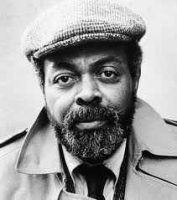
Nobody sings anymore.
And then last night I tiptoed up
To my daughter's room and heard her
Talking to someone, and when I opened
The door, there was no one there…
Only she on her knees, peeking into
Her own clasped hands
—from “Preface to a Twenty Volume Suicide Note” by Amiri Baraka
“Nobody sings anymore.” – Amiri Baraka
World Poetry
Appeal Launched to Collect Poetry in Endangered Languages
From Assyrian to Irish Gaelic, the National Poetry Library is launching a major new project to collect the poetry of thousands of languages in danger of dying out, and preserve them for future generations. According to Unesco, of the 7,000 languages spoken in the world more than half are endangered, with one dying every two weeks. For the library, Chris McCabe said: “By the end of the century, Unesco estimates that half of our languages will be lost, and when languages go, their poetry goes too.”
SA Poet Barred from UK
An acclaimed South African poet and author has been denied access to the UK, despite charming many in the country for describing the University of Oxford as "Disneyland for nerds”. Athol Williams – author of Pushing Boulders and the Oaky series of children's books – was due to return to Oxford on Wednesdaybut was denied a UK visa.
The 13-year-old Syrian Refugee Who Became a Prize-winning Poet

“I take words from anywhere,” says Amineh Abou Kerech, moments after winning the 2017 Betjeman poetry prize for 10- to 13-year-olds last week. “I take them from songs and films, from what I see on the computer or the television. And I put them all together.” She makes it sound so simple. It’s anything but, according to her older sister Ftoun, who is smiling at Amineh across a pub table in London’s St Pancras station. “She sits in her bedroom all the time and practises, practises.”
Qatar Revokes Citizenship of High Profile Poet Mohammed al-Marri
Qatar revoked the citizenship of poet Mohammed bin Futais al-Marri, who holds the title Millions’ Poet, after accusing him of supporting Saudi Arabia at the expense of the Qatari government. The hashtag “revoking Bin Futais’ nationality” went viral on social media pages as many thought the decision was unjust. Doha accused Marri of supporting Saudi Arabia amid the crisis between it and the four Arab countries (Saudi Arabia, Bahrain, the UAE and Egypt) and after he called on the government to stop supporting terrorists in the Middle East.
Amineh Abou Kerech, a 13-year-old Syrian regugee, won the 2017 Betjeman poetry prize.
Recent Reviews
Danez Smith’s Ecstatic Body Language
In “Don’t Call Us Dead,” the poet brings the unruly power of performance to the written word.
by Dan Chiasson
The American poet Danez Smith’s third book, “Don’t Call Us Dead” (Graywolf), opens with “summer, somewhere,” a stunning elegy that contains a tense refusal:
somewhere, a sun. below, boys brown
as rye play the dozens & ball, jump
in the air & stay there. boys become new
moons, gum-dark on all sides, beg bruise
-blue water to fly, at least tide, at least
spit back a father or two. i won’t get started.
history is what it is. it knows what it did.
Stephen Romer, Set Thy Love In Order: New & Selected Poems
by Chad Campbell
Is Steve Romer a love poet? How much did his move from England to France in the eighties influence his style? If we’re to take him at his word, he doesn’t “feel part of any French tradition, except perhaps an earlier one…that goes back to Baudelaire” – a poet who could be found on the family tree of influences so often that he might as well be the common ancestor of bookmarks or redheads. Romer’s first “good God” moment came when he was a schoolboy, bored in the back of class, and came across poems by Tom Gunn and Ted Hughes.
A Parliament of Poets
by Scott Beauchamp
As Evan Kindley acknowledges near the beginning of his new book, Poet-Critics and the Administration of Culture, the history of the poet-critic in the West is as enduring as it is fraught with ambiguity.1 The tradition of poets not simply making cultural artifacts out of language, but also wielding some sort of intellectual control over the broader shape of culture itself, goes back to the very beginnings of Western thought. In Plato’s Apology, after being accused by Socrates of not understanding their own poetry, the poets join the politicians and scholars in condemning the gadfly to death.
Is Steve Romer a love poet? How much did his move from England to France in the eighties influence his style?
Broadsides
On Editing Marianne Moore
by Heather Cass White
In trying to sum up the experience of having spent the last ten years editing the poetry of Marianne Moore, most recently in the New Collected Poems, I think of a recent classroom interaction I had. Toward the end of a course on twentieth-century poetry, one of my students, clearly at the end of her patience with me, demanded to know why I kept asking them, “But what is a poem?” It’s probably a measure of how deeply I feel that question that I hadn’t noticed I’d asked it even once before she pointed it out. I do know why I am stuck on it, however. Editing Moore’s work will deprive anyone of their certainty about what a poem actually is.
Feminist, Lesbian, Warrior, Poet: Rediscovering the Work of Audre Lorde
The American activist showed a generation how to fuse the personal and political.
by Jackie Kay

To write is to create something that will have its own life, Audre Lorde thought. A writer needs to hold her nerve, conquer her fears and speak out. Her great mantra – and the title of this Lorde reader, which collects for the first time in a single volume a selection of her poetry and essays – was: “Your silence will not protect you.” It’s strange to think that Lorde would now be 84. (She was 58 when she died in November 1992.) Trying to imagine what she would have made of the world we live in today is not the least bit difficult.
To write is to create something that will have its own life, Audre Lorde thought.
Drafts & Fragments
Ted Hughes, the 'brilliant, rugged Yorkshire poet' – New Sylvia Plath Letter Revealed
by Anita Singh
A previously unseen letter from Sylvia Plath, written weeks after her first encounter with Ted Hughes, reveals how she fell for the "brilliant, rugged Yorkshire poet”. Plath wrote an aerogramme to Patricia O'Neil Pratson, an American friend, from her rooms at Newnham College, Cambridge, informing her that she had a new man in her life. The contents have remained private until now. It is included in a new volume, The Letters of Sylvia Plath, published next week.
Slave Poet's Lost Essay On 'Individual Influence' Resonates Through Centuries
by Scott Simon
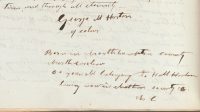
George Moses Horton published a book of poetry in 1829, when he was still a slave in North Carolina. He went on to write several volumes, which never earned enough money to buy his freedom — though he became a frequent presence on campus at the University of North Carolina at Chapel Hill, where he wrote love poetry on commission for students. Horton was finally set free by the Union Army in 1865, moved to Philadelphia and continued to write until he died.
Israeli Poetry Helps Lena Dunham Find Her Judaism
by Rosa Doherty
Lena Dunham has reconnected to her Judaism though the verse of modern Israeli poet Yehuda Amichai. The Jewish actress and Emmy-winning creator, writer and star of the HBO series, Girls, confessed to her 3.2 million followers on Instagram that the poet had made it possible for her to move “beyond bagels, sample sales and crushing guilt”. The actress whose father is Protestant and mother is Jewish, has always described herself as “culturally Jewish.”
George Moses Horton published a book of poetry in 1829, when he was still a slave in North Carolina.
Poetry In the News
Mapping Seattle, Poem by Poem
Seattle has a new way of mapping itself — through the so-called “Poetic Grid,” an online map of the city from the voices of people who live there. Claudia Castro Luna dreamed up the idea in 2015, when she became Seattle’s first civic poet.
State Bar Committee Approves Jail-To-Yale Lawyer

A former inmate who graduated from Yale Law School last summer has received the greenlight to practice in Connecticut. Reginald Dwayne Betts was admitted to the bar on Friday after a meeting with the state’s examining committee. “He is gratified with the action of the committee, and he looks forward to continuing the work he’s been doing, only this time as a lawyer where he can be more effective than he’s been,” said William F. Dow III, the New Haven-based attorney who represented Betts in this matter. “He’s grateful to the many people who’ve helped him, especially a significant number of inmates, who don’t even know him, but who appreciate what he’s done and the hope that he’s given to them.”
Reginald Dwayne Betts, a former inmate who graduated from Yale Law School, has received the greenlight to practice in Connecticut.
New Books
Devotions: The Selected Poems of Mary Oliver by Mary Oliver
[Hardcover] Penguin Press, 480 pp., $30.00

Throughout her celebrated career, Mary Oliver has touched countless readers with her brilliantly crafted verse, expounding on her love for the physical world and the powerful bonds between all living things. Identified as "far and away, this country's best selling poet" by Dwight Garner, she now returns with a stunning and definitive collection of her writing from the last fifty years.
In the Still of the Night by Dara Wier
[Hardcover] Wave Books,112 pp., $30.00
"That's how one human leaves us" ends the first poem of Dara Wier's direct and powerful new collection, a raw and fluid exploration of grief. Wier records her thoughts with intelligence, clarity, honesty, and immediacy, showing us the unraveling of her world and her new consciousness after a great loss.
Good Bones: Poems by Maggie Smith
[Paperback] Tupelo Press, 114 pp., $16.95
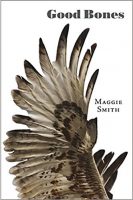
Maggie Smith writes out of the experience of motherhood, inspired by watching her own children read the world like a book they've just opened, knowing nothing of the characters or plot. These poems stare down darkness while cultivating and sustaining possibility and addressing a larger world.
All We Saw: Poems by Anne Michaels
[Hardcover] Knopf, 96 pp., $27.00
In All We Saw, Anne Michaels returns with strikingly original poems to explore one of her essential concerns: "what love makes us capable of, and incapable of." Here are the ways in which passion must accept, must insist, that "death . . . give / not only take from us." This piercing short collection treats desire in a style that is chaste, spare, figuratively modulated, and almost classical in its precision. In lyrics that ponder what happens to the bodies of lovers–so vital when together, different when apart, death coming to one before the other–Michaels embraces both the intimacy and the vastness of the connection between two people.
The Lazarus Poems by Kamau Brathwaite
[Hardcover] Wesleyan, 120 pp., $24.95
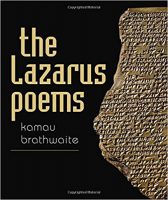
This new book by the great Barbadian poet Kamau Brathwaite is characteristically sui generis, vatic, and strange, exhibiting ornery bravura. Tonally and typographically frenetic in the ‘sycorax video style’ he’s been employing for decades, the work examines a major theme appropriate to a great poet in the late stages of his career: that of the afterlife. Brathwaite performs a kind of spiritual/aesthetic GPS in his poetry and is is a poet of undeniable stature, writing the final poems of his career. Central to the book is a series of poems outlining the speaker’s (the poet’s) experiences with what he calls “Cultural Lynching.” These poems speak of appropriation, theft, isolation, and exploitation, all within a context of an American hegemony that intensifies the racial politics and ageism underlying the events
The Lazarus Poems by Kamau Brathwaite is characteristically sui generis, vatic, and strange, exhibiting ornery bravura.
Correspondences
All the Poets (Musicians on Writing): Patti Smith
by Scott Timberg
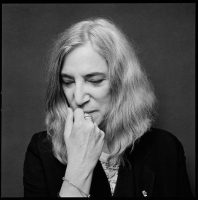
After decades as a major force in punk rock — dating back to her shows at CBGB’s and her 1975 LP Horses — Patti Smith has earned a considerable reputation as a literary figure as well. She has introduced books of poems by Blake and Rimbaud, published several volumes of her own verse and song lyrics, and won the National Book Award for Just Kids, her 2010 memoir about her crucial early years with photographer Robert Mapplethorpe. Smith’s new book is Devotion, a slim volume that is — at once — an ode to her favorite French writers, a short story or fable about a mysterious young ice skater, and a meditation on the creative process. (It is based on a speech Smith gave at Yale and is part of Yale University Press’s Why I Write series.)
Voices of the City: Robin Coste Lewis' fierce and arresting poetry has its roots in Compton
by Jeffrey Fleishman

The white fence is new but the tree she planted as a child still stands in front of the wood house, now stucco, pale yellow and cracked, forgotten Christmas lights hanging from its eaves. She laughs. Time sucks her back, the way it does, and she talks about backyard camping, cockfights and how men dressed up in suits after dinner and strolled through Compton until way after dark, imagining what they might have become if they were another color. Not black.
Robin Coste Lewis’ fierce and arresting poetry has its roots in Compton, CA.
Envoi: Editor’s Notes
"The lyric poet is, of course, the great hidden personality of our time. They can write about "I"–I feel, I want, I do, I am–and really be hiding the world because all they’re talking about is this great vacuum in my heart that must be filled by, I don’t know, ice cream cones, a walk down the street, another person. You know what I mean, it could be anything? That’s the lyric "I"–I want, I need. But actually to begin to talk about who is I and where is I in the world among all the other I’s, and how that relates to a real objectively existing world that exists independent of us. The world exists independently of us–if you can get that in your mind. The world does not depend on you to exist, it exists independent of you. That’s hard sometimes, because we’re so subjective, especially we great artists, we think the whole world is in our heads. It’s not. The world exists independent of your will. Things will happen you don’t want to happen. How did we get here? That point of writing past the preservation of everything, being able to grade your work–you know what I mean, being able to tell the fake from the true–and of getting past imitating yourself, those are important things."
—from an interview with Kalamu ya Salaam at the NOMMO Literary Society, February 17, 1988.
The world exists independently of us–if you can get that in your mind. The world does not depend on you to exist.” – Amiri Baraka